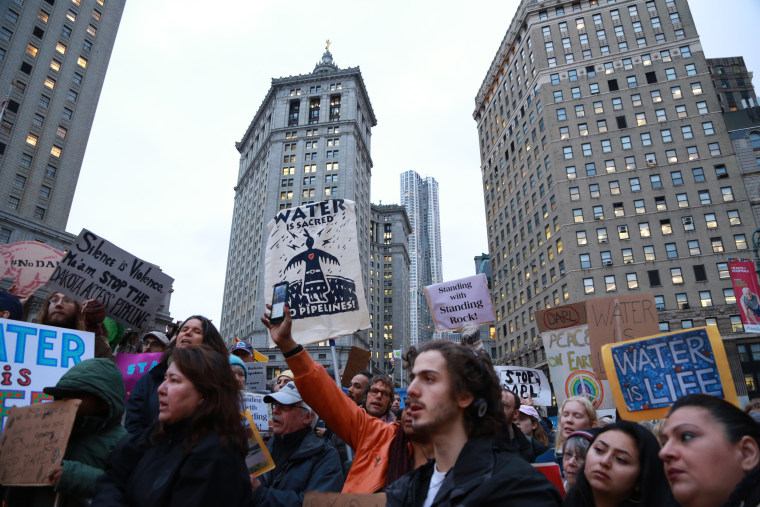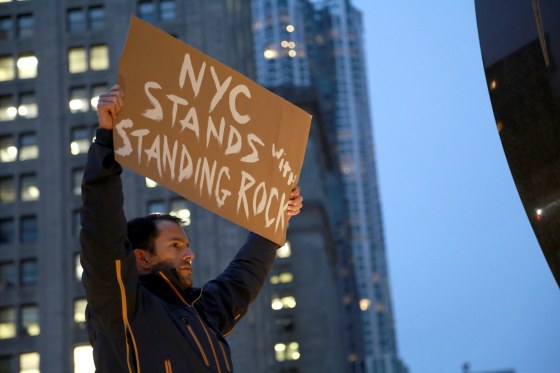
Thousands gathered across the country Tuesday in coordinated demonstrations to protest construction of the controversial Dakota Access Pipeline.
Dozens were arrested in what organizers called a "National Day of Action" by self-proclaimed "water protectors" near Army Corps of Engineers offices from Los Angeles to New York City. The protests planned for more than 300 communities across the U.S. were an intended show of solidarity with the Standing Rock Sioux Indian tribe, which says its drinking water and way of life are threatened by the proposed pipeline.
Related: Army Corps Says Pipeline Can't Continue Without Tribe Input
In Los Angeles, an estimated 1,500 protesters gathered peacefully in the financial district, while hundreds participated in a march at Daley plaza in Chicago. Sen. Bernie Sanders joined a crowd in front of the White House, and police in riot gear met protesters marching in Denver.
In Mandan, North Dakota, about 40 miles from where the pipeline would cross on the border of the Standing Rock Sioux Indian Reservation, 350 protesters blocked a railroad with a pickup truck and other debris. More than 25 people were arrested, some on felony charges, according to the Morton County Sheriff Department.
Over 1,500 anti-Dakota Access Pipeline protesters marched in Lower Manhattan, many holding signs and placards decrying the pipeline, and others warning of a bleak future for their cause under a Trump administration.
After the rally, approximately 39 people staged a sit-in just opposite the U.S. Army Corps of Engineers' office. The group repeatedly chanted "protect our water" as dozens of police officers surrounded them threatening arrest for disorderly conduct. All were arrested, according to police.
Earlier Tuesday, a half-dozen Iraq War veterans presented a letter to the Army Corps office requesting the agency deny Energy Transfer Partners the easement permit it needs to complete the 1,170-mile pipeline in North Dakota. The letter, addressed to U.S. Defense Secretary Ash Carter, urged the Corps to "lead by moral example."
Army Corps staff assured the veterans that their efforts — along with the protests and mass actions of thousands across the country since August — had been recognized by the agency, said Nicole Goodwin, one of the veterans present at the meeting.
"I feel that as a former solder [in Iraq], I was on the wrong side of history," Goodwin told NBC News. "Now I feel that I'm on the right side of history — as a mother, as a citizen of the United States and as a water protector."
Tara Houska, a Director for Honor the Earth, traveled from Standing Rock to New York City to speak at the rally. "Because of the power of social media and the millions of those at Standing Rock, [the Army Corps] are going to invite the tribe in to discuss their concerns," Houska said.

The Corps on Monday wrote in a letter to the tribe and the company behind the pipeline saying more analysis and discussion with the tribe is necessary before the pipeline’s construction can take place under the Missouri River.
In response, Energy Transfer Partners — the company building the pipeline – filed for a court judgment Tuesday that would allow it to finish the pipeline. “Dakota Access Pipeline has waited long enough to complete this pipeline,” Energy Transfer Partners CEO Kelcy Warren said in a statement. “It is time for the Courts to end this political interference and remove whatever legal cloud that [sic] may exist over the right-of-way beneath federal land at Lake Oahe,” said Warren.
"It’s important for us to show solidarity across the country for those of us who can’t be there at Standing Rock," said Korina Emmerich, a Brooklyn resident and member of the Puyallup tribe, who participated in Tuesday's action. "It’s so important to show that we are not stopping until they stop building the pipeline," said Emmerich, carrying a sign that read "Don’t sign our Mother Earth over to pollution, war + greed."
The fate of the project lies with the U.S. Army Corps of Engineers. For weeks, the agency has been conducting a federal environmental review of the land in question. In its letter Monday, the Corps did not provide a timeline for its final decision.


